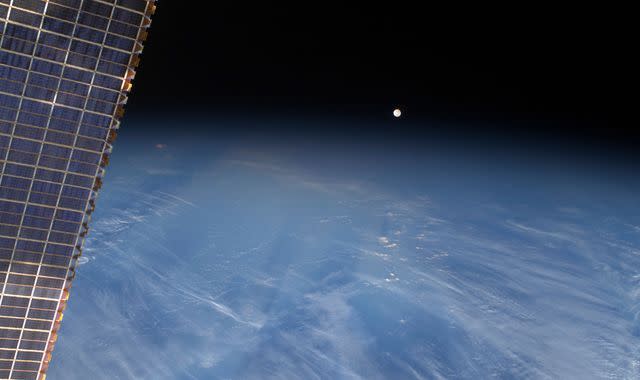Warfare is changing: Is space the new military frontier?

Speculation that Russia might be developing a new space-based nuclear weapon has led to a flurry of discussion about what is going on - and what it could mean to see military installations in space.
But space is already used for military purposes. Thousands of satellites orbiting the Earth are crucial to missile targeting, fighter jet navigation and nuclear weapons control.
So is space the new frontier for warfare, or are the disadvantages so great that it's just not worth it?
Sky News spoke to three space experts to explore the topic.
Thousands of satellites orbiting the Earth
There are more than 8,000 satellites orbiting the Earth, and that number is only increasing.
"Think about how much of our everyday lives are determined by satellites in orbit," Sky News science correspondent Thomas Moore says.
"Everything from telecommunication to GPS... we are dependent on that eye in the sky. So this is going to be something that all major powers are looking at."
There are 31 operational GPS satellites, he says, of which 24 are needed for accurate positioning worldwide.
So there is some redundancy built in - several would have to be taken offline to disrupt things on the ground below.
Is space already militarised?
But these satellites aren't just used for civilian purposes, says Dr Bleddyn Bowen, an expert in international relations in outer space at the University of Leicester.
Space, he says, has been militarised for decades.
"The first things that went up there were military by design, military by nature, for military purposes.
"And the bulk of the space age really is about these satellites in space, not astronauts, not the space station, not boots on the moon. They're just sideshows.
"So the space environment, as long as we've been physically using it with machines, it's been for military purposes."
Can satellites be destroyed?
Yes. But that's not a revelation linked to the speculation around whatever new capability Vladimir Putin's military is apparently developing.
The US, Russia, China and India have all successfully shot down their own satellites, proving that such a thing is possible in war, if it were ever needed.
Also, the dual use of satellite technology in space is "rife", says Dr Bowen. This consists of "close inspections or close flybys" of satellites by China, Russia and the US - experimenting with the potential to use an object in space to ram another.
"You need to master those close orbit technologies and inspection technologies if you want to actually attack those satellites with something that isn't a nuclear bomb."
But the consequences of destroying a satellite with a kinetic (physically moving) weapon can be huge, he adds.
"You'll create a cloud of debris that can then hit other satellites... There's no control over that."
Read more:
Russia 'developing space-based nuclear weapon' to target satellites
The space race to the moon that could change everything
SpaceX rocket launches for moon's mysterious south pole
What about other weapons in space?
That is supposedly banned under the UN's Outer Space Treaty, to which the US and Russia are party, says Dr Sarah Jane Fox, an expert at Space Park Leicester.
She says its provisions include the prohibition of nuclear weapons in space and limiting the use of the moon and all other celestial bodies to peaceful purposes.
Asked if she expected this treaty to hold, she said: "It's an interesting one. It's held since we first went into space, so since the 1950s, with written agreement being formalised in the latter part of the 1960s.
"Warfare is changing, the domains of warfare, we've got land, sea, air, cyberspace and space. The most recent two, space and cyberspace, will no doubt present a challenge moving forward."
But what if someone was minded to ignore the UN treaty, would it make a difference stationing a nuclear weapon in space?
Dr Bowen says: "You don't need to put nuclear bombs in space to still use nuclear weapons in space because most nuclear weapons are based on Earth. They're in missile silos, on submarines or on aircraft.
"You can modify those very easily just to fire up into space and rather than fall back down they just detonate in space."
Setting off a nuclear bomb in space would make a "huge mess", he says.
"You'll just have an electromagnetic magnetic pulse and loads more radiation in orbit, which will fry the electronics of so many satellites (and) possibly knock out power grids in places down on Earth."
Moore added that he was not sure how much advantage - other than a reduced reaction time - a state might have firing a nuclear weapon from space than from a location on Earth.


